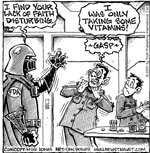Three Important Things Users of Natural Supplements Need to Know About Zinc Gluconate
| Share on Facebook | Share on Twitter | Share on Google+ |
Zinc gluconate is a popular form of zinc for use in supplements. As its name suggests, gluconate is the result of fermenting glucose sugar, usually by a bacterium in the penicillin family. (There is no penicillin in the final product.)  Because zinc gluconate combines zinc with a substance that is very similar to sugar, the zinc in zinc gluconate is readily absorbed into the bloodstream-but this is not always enough to overcome the disadvantages of using zinc gluconate. Here are three things every consumer of natural supplements needs to know about zinc gluconate.
Because zinc gluconate combines zinc with a substance that is very similar to sugar, the zinc in zinc gluconate is readily absorbed into the bloodstream-but this is not always enough to overcome the disadvantages of using zinc gluconate. Here are three things every consumer of natural supplements needs to know about zinc gluconate.
- Zinc gluconate is more rapidly absorbed by the bloodstream, but the amount of zinc gluconate that has to be put into a supplement is relatively high.
- Zinc gluconate is the best form of zinc for preventing and treating colds.
- It's not a good idea to spray zinc gluconate, or any other form of zinc, up your nose.
It takes 7 milligrams of zinc gluconate to yield one milligram of elemental zinc. It takes just two milligrams of zinc carbonate to yield one milligram of elemental zinc.
If you are taking zinc to build up the zinc levels of your whole body, you can take a much smaller pill if the zinc is in the form of zinc carbonate or zinc sulfate. The company that makes your supplement can put more zinc in the form of zinc carbonate or zinc sulfate in a smaller pill. But if you are trying to get zinc to your nasal passages and throat to prevent a cold, then zinc gluconate is a better ingredient.
The thing to remember about using zinc for colds is that you don't need zinc for your whole body. You just need to get it to your nasal passages and throat to stop the virus from getting inside those cells.
You can take a zinc gluconate nose spray, but you get a longer, more effective flow of zinc from sucking on (not chewing or swallowing) a zinc lozenges. Your saliva dissolves the zinc and the first time you sneeze, you will have zinc where it needs to be in your nose. Zinc carbonate and zinc sulfate don't dissolve as well in saliva and don't deliver as much zinc to your upper respiratory tract.
Zinc gluconate nose sprays sometimes cause unexpected side effects. If there is an unusual settling of zinc particles in the spray, then the nose either gets too little zinc, not enough to fight the cold, or too much zinc, sometimes so much that it interferes with the sense of smell. The effects of zinc overdose on the senses of smell and taste can last for years.
It is always better to use a zinc lozenge than it is to use a zinc nose spray. If you do use a nose spray and your sinuses hurt, see a doctor right away to prevent permanent damage to your ability to taste and smell. Zinc gluconate lozenges, are entirely safe, if you remember their purpose is to deliver zinc to your nose and throat, not to the rest of your body.
-
Skin CareMen Skin Care
-
Free ResourcesFree eBooks
-
A good laugh and a long sleep are the best cures in the doctor's book.Irish Proverb
-
Featured Health Supplement
 ...don't believe those companies or people who say that tablets are not as bio-available. If they are designed and manufactured correctly it is possible to deliver results which are impossible to do with either liquids or capsules.
...don't believe those companies or people who say that tablets are not as bio-available. If they are designed and manufactured correctly it is possible to deliver results which are impossible to do with either liquids or capsules.
-



















